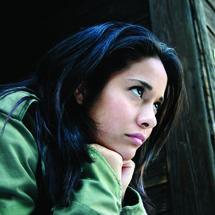
Children’s rights in Scotland took three quiet steps forward last week.
Blog by Graham O’Neill, Policy Officer
First, the Scottish Parliament debated the principles of the new Children and Young People (Scotland) Bill, a potentially ground-breaking piece of child-centred legislation, in so far as the Bill seeks to embed the UN Convention on the Rights of the Child (UNCRC) into Scots law.
Second, the Scottish Guardianship Service, which we at Scottish Refugee Council run with Aberlour, was awarded the Herald Society’s Young People’s Project 2013. A moment’s reflection confirms this service is essential for children, completely new to Scotland, who do not have what so many of us take for granted: a parent or guardian giving unconditional attention and looking out for their best interests. Westminster’s Joint Committee on Human Rights agreed, recommending the SGS model be piloted and adapted in the rest of Britain.
Third, the report ‘State of Children’s Rights in Scotland 2013’ was published by Together, an alliance of non-government organisations advocating for the fullest implementation of the UNCRC in Scotland. This is a vital report, which gives voice to real life issues for children and youngsters here.
Recommendations for the vulnerable
So, it is the final step, the State of Children’s Rights in Scotland 2013, which I focus on. I was delighted to contribute to the chapters and recommendations for two of the most vulnerable and overlapping groups in contemporary Scotland, namely unaccompanied children and young people, and child survivors of trafficked exploitation.
Before saying more, we need some context: Together share with Scotland’s Commissioner for Children and Young People, the responsibility to shadow report the Scottish bit of the UK Government’s submission to the UN Committee on the Rights of the Child, which considers whether and how the UNCRC is being fulfilled. Such independent opinions should assist the Committee to offer fair, evidenced, and prescient Concluding Observations on Scotland.
This responsibility is significant as it means Together, and its partners, have an inside track to influence the UN’s international protection of children’s rights. The reports provide not only the UN Committee the “second opinion” it needs to assess children’s rights, it gives us all what we need to focus on the new or persistent challenges facing children today.
Three problems dealt with
What then does the ‘State of Children Rights in Scotland in 2013’ tell us? There were three significant, persistent, and if left alone, damaging problems included in the report:
- Child poverty: in some parts e.g. Dundee and Glasgow, is amongst the highest in UK, with Scotland having 1/2 of the poorest area e.g. where 2/3 of children are in poverty;
- Domestic abuse: children and women remaining at most risk of and suffering domestic abuse, with more need for early interventions before crisis situations;
- Bullying: if unchallenged bullying can constrict a life, with minority groups particularly vulnerable, girls being sexualised, and cyberbullying very common.
These afflict all communities; but domestic abuse for instance is inherently gendered with the experience of violence and neglect inseparable for many girls and women. Racism is pervasive; affecting perpetrators, survivors, but also by-standers who, whether they realise it or not, are affected by their passivity, condoning, or tolerance of the suffering of others.
Specific problems
However, it is visible minorities, including many refugees, Gypsy Travellers, Muslims that feel the prejudice most, as do so-called sexual minorities or persons with disabilities. In all, though, children suffer, sometimes directly, sometimes indirectly. Together’s report spoke to this often neglected fact.
And, the prejudice problem is, almost by definition hard to pin down, as research has demonstrated that survivors of prejudice don’t report first, second, or even the third or the tenth time, meaning like other forms of stigmatised crime, there will be substantial under-reporting. So hate crime statistics probably are the tip of the prejudicial iceberg in Scotland.
However, there are some vulnerabilities and exploitation that are disproportionately felt within some communities, and we at the Scottish Refugee Council are exposed to these and do, as one would hope and expect, seek to understand and challenge them. Female Genital Mutilation or those refused asylum being destitute are but two severe examples.
Overall, Together’s report has excellent recommendations for change, the touchstone of which is that the best interests of the child should inform all practice with children and young people, including those highlighted by Scottish Refugee Council: that separated children really need independent advocacy, and child survivors of trafficking must in Scots law, get statutory rights to recovery from trafficking and protection from criminal justice consequences for offences committed as a manifestation of their trafficked predicament.
